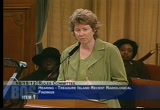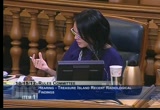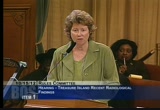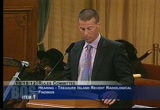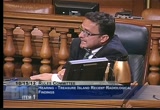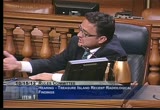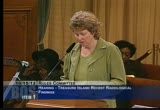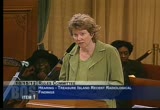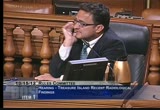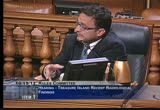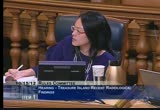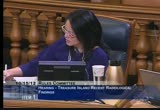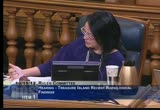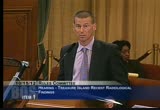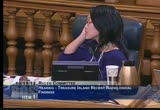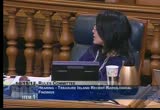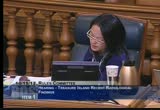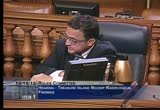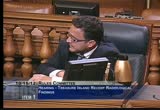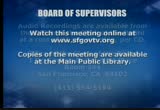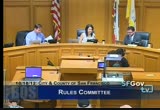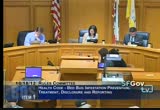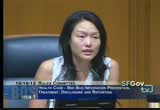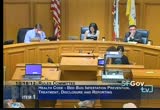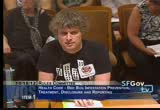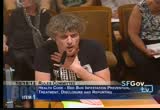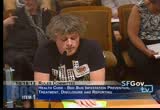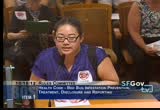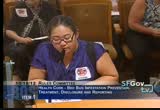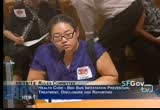tv [untitled] October 29, 2012 6:00am-6:30am PDT
6:00 am
october 5th where additional high traffic areas that they wanted to verify that there wasn't any concern. so, some of the other residential areas, there is no concerns. there's no evidence of past contamination. there's no reason to suspect that there is any radiological contamination. >> so, if you could just be clear about that. one of the questions is why wasn't it the neighborhood areas weren't assessed? if they were not assessed, is because -- >> there was no reason -- it was not identified as an impacted area. no evidence of any contamination. >> the only areas that were surveyed were the areas that were surveyed because they were identified as potential sites by the navy? >> there's two categories. there was potential sites. on the map it's the orange hatched areas. and in addition there were five areas of high traffic areas and high-use areas where we asked
6:01 am
them to additionally assess to just verify. >> okay, thank you. and then about the 1231-12 33, this was brought up. the question was is it okay for the neighbors to walk their dogs because the area is not [speaker not understood] off. >> my understanding is if it is okay, i am not familiar with those exact house numbers. >> could you please follow-up? >> yes, i can follow-up on that one. >> great. one of the other questions -- a couple of members had brought up the issue of the pipes. and how can we ensure that the pipes are free from contamination since they are below ground? >> so, i think people understand the water comes from hetch hetchy. but are we worried about contamination from the pipes that are below ground, probably below the 12 feet that's being assessed and surveyed. and what can we do if we do find green and brown water, is there a way to get that tested, is there someone they can call? * >> so, again, sfpd is in charge
6:02 am
of operating the system. and they are doing the required -- they're assisting and working with the navy, i believe, so make sure that they get the water tested so verify that it meets all drinking water standards and they're required to do that. another fact that people should know is that because it's a water delivery system, it's under pressure. and, so, the water is in the pipe flowing out. the contamination is not flowing in because that's just how the water systems work. and, so, in general the rule of thumb is it is not of concern because the water is the clean water from hetch hetchy is coming through the pipes. and if there is any -- i know that old systems can have looks. the water would flow out. you wouldn't have contamination. as far as the green inbound water, i would need tida or sfpuc to answer the question about that. >> okay. so, maybe i'll have someone from tida address that question in particular.
6:03 am
and whether people can use the hotline to call in if they put that water in a cup and some of the residents have said that they do. thank you, mr. timoff. >> thank you, madam chair. to address the question on water quality, the puc does test annually for chemicals of concern. we can report back on those findings, but to date the water quality out on treasure island has been tested to show no human health safety concerns. having said that, because of some of the recent comments we have received, the puc is currently going to be conducting water coming -- conducting testings from water coming out of the actual tap. so, we're working on getting that scheduled for the end of october. >> thank you, mr. timoff, i appreciate that. supervisor campos. >> thank you. if i could ask that -- her to come back. >> ms. brownell? >> yes. sorry.
6:04 am
and, again, i want to thank everyone who has been working on this. i appreciate that. a lot of work has gone into this and i want to appreciate the work from the treasure island staff for their responsiveness. i guess one question that i have, and i appreciate everything that you have said is i understand all the things that have been done, and i understand, you know, that many tests have been, you know, done in the last few months. i also feel that part of the responsibility for us is not only to, you know, follow the rules and the guidelines that are in place by these various agencies, but to the extent possible, really go the extra
6:05 am
mile. and, so, even though there was a reason why we have tested specific areas on the island, what's wrong with testing some of these neighborhood sites? i mean, there is nothing that precludes us from doing it. we may believe that for different reasons there's no need scientifically or otherwise to do it. but i don't see that we lose anything by going that extra step and actually following the suggestion of the residents. so, i'm wondering why not do it anyway? >> thank you, that's a very good question. i think there are a couple of reasons why. first of all, as you've noted, there is a lot of fear and anxiety around this issue. when you start to do tests in areas where there is no reason to suspect and there's no
6:06 am
reason that you have any evidence that there would be any problem, the testing itself, even though it can be helpful, it can also cause more fear and anxiety and that is just as much of an issue as the actual scientific issue. but also i just wanted to state again that all of the areas that were these new designated areas of possible issues that they're going to investigate further through paperwork or whatever they need to do, they've all been scanned and there's been nothing above background. and i just wanted to give them a little bit of perspective because one speaker mentioned that. as i mentioned, there is radiation everywhere all the time every day. everybody is exposed to it. you have it in your own body. and the average annual exposure for an individual is 6 20
6:07 am
milligram per year. this is an average. so, people who live in the sierra, whether it's higher soils that have a higher natural background level, they have maybe a higher end of that average. and people who get a lot of medical procedures with x-rays would have higher averages. but that average is you get a lot of it from medical exposures. there's radon in air you get it from, the soil, water, consumer project cosmic rays and industrial and occupational exposure. so, every human being in the u.s. has about that average on -- they have done studies and measured. in addition to that, this regulatory limit that i mentioned is that up to 100 milligram per year is the allowed amount that the regulators set from radiation sources. and, so, by comparison, i just want to mention that the background scans -- and it's in
6:08 am
these reports that were sent to the residents and given to you today -- the measurements they're taking and measuring are .01 milligram per hour. and if you do the whole calculation in per year and all that, it's way less, way less than what we're seeing. so, that's why we can say with confidence that all these areas that have been scanned are way less than anything of concern. >> and i appreciate that. you know, i am not an expert in this, and certainly radiation. and i think that everything you said makes a lot of sense. but where i disagree with you is on your point about the impact of additional testing. i actually see it differently. i actually think that the lack of trust is not going to go away, and i actually think it will only intensify.
6:09 am
and i think that taking that extra step, even if it's a pain, even if it is expensive, it is something that if i live there that i would like to see my government do. and, so -- (applause) >> it's not to take anything away from what you said. i respect your judgment and your professional judgment on this. but i think that as a matter of policy for the city, i would rather err on the side of doing more than less. and, again, i just think that from my perspective, it's what i would want for my family. and, so, i don't know if that's possible, but i would simply urge the city to do that. i think it's money well spent. (applause)
6:10 am
>> ms. brownell, if i have family and i lived on the island, obviously what i heard, if i was to make a request to dph or to i guess the appropriate agencies, would we be able to do additional assessments by request? is that something we can figure out a way to figure out a system for? >> we can certainly explore that idea. again, the california department of public health is the agency -- >> they're the ones that do that? >> -- that did those studies and we can talk to them about that concept. >> okay. i think that as much as we can, because -- i think we have to understand the concerns are reasonable. that regardless of what we say, regardless of what our regulatory is saying, when you have children, when you yourself are living on the island, you're going to continue to have concerns regardless of what is being said. if there is a way we can figure out if additional testing can
6:11 am
be done by request, i would like to figure that out. the second question that came out was defining what survey meant. and i know you went over this briefly in your presentation, but could you go into a little bit more detail about what is a survey and what are they surveying for? >> okay. so, again, the california department of public health goes out and it's in the reports that they did, and they take their instruments to measure the gamma walk over surveys of the areas and they take the specific instrument, ludlow model micro 19 meters and they scan the area to see if there are any concerns. so, that is what they are doing and how they are measuring the area. >> so, in the survey you are measuring for -- >> they are measuring to verify that there's no radiation concerns above the background levels. >> okay. within that -- i'm sorry, again, i'm not an expert
6:12 am
either. but one of the members of the public had talked about gamma versus other types of radiation. are we only surveying for certain types or all types? >> my understanding is they're surveying for gamma. that is the concern because it is the most -- highest penetrating. you can see it from a long distance. it can travel through soil and all of that. >> thank you. this last question may be for tida. it's about the clarification requirements around digging. so, one member of the public had stated that they weren't sure of the requirement or not or if there is a recommendation [speaker not understood]. i'm not sure if that can be clarified today. >> so, as the comment was made,
6:13 am
we did go through a series of revisions to the existing lease, including looking at the environmental disclosure section which talks about the fact that the navy is undergoing investigations on the island and providing information regarding the regulatory oversight. in addition, there is in the house rule section in the proposed addendum re, which we had gone through extensive community meetings and worked with the residents to address their concerns, there is a provision that would prohibit digging in backyards. and the speaker is correct that the existing lease has a language, i'm not sure exactly what it states, but recommends not digging. and out of an abundance of caution, given the information that what made available to us last year, we inserted the new language which would prohibit, expressly prohibit, i think the language is "shall not dig in backyards." >> okay. just to clarify, previously it
6:14 am
was a recommendation, tida got the information last year and you changed that to requirement in the existing leases? >> correct. >> thank you. that actually is all of my questions today. i think, you know, in the best case scenario, particularly as one that is representing the residents of this island, i would. wished that the outcome could be that everyone feels safe after this hearing. and i think that that is a tall duty. given i think the circumstances of how this news came out in particular, i was very disappointed with the way and the manner with which the navy conducted itself in releasing this information because i think now, of course, we have a lot of concerns around health issues on the island, which i completely understand. moving forward, we do still have residents living on this island and i want to be able to address some of the present concerns as completely as possible. one, of course, is a hotline that tida will be running
6:15 am
monday through friday -- it will be running all the time. so, there's one number people can use to report any concerns or to ask any questions about the ongoing clean up operations on treasure island. and, so, that number is the hotline that tida will run and will respond to within one business day. i know there are questions, of course, about what to do if we observe people in those areas on the weekend. and i'm hoping that the answer to that is that we can call sfpd ento ensure no one is getting in those areas and potentially putting residents at risk. the second is that we would work with dph to conduct the health assessment and the screening day on the island and meeting. director barbara garcia has committed to a meeting with the treasure island health network to talk about next steps. , and of course, to see if we can do an assessment and screening day on the island and perhaps we can contact some of
6:16 am
our partners. i'm here in san francisco life ucf to be a volunteer that day. i will work with ms. lundgren on that. the third issue that was not the topic of this hearing is of course the power outages. we were hoping that by the first two weeks of november there will be something that we can present, a solution that we can present with the puc and the treasure island development authority to address the electrical outages. i just want to take a moment just to thank everyone for being here today. i know that it is not always comforting to hear, but this is the information that we have and this is the assessment the city has made on the reports that cdph and dtsc has given us along with the navy. i just want to assure residents that our office and tida will continue to be an advocate for the residents and make sure we get all the answers that we can and all the assessments and to make residents feel as safe as possible given the news and
6:17 am
what they have heard. i think we'll end on that note. i think that most of the residents here know our office [speaker not understood] who is our legislative aide staff from treasure island, will continue to work through with you on many of the issues that have come forward. supervisor campos? >> i just wanted to thank you, chair kim. you know, as i said earlier, i think that the way to approach this and i think that's exactly how your office is approaching it, is to, to do for these residents what we would do for ourselves if we were in that predicament. so, i appreciate that. and i think it's important to err on the side of caution, to provide that reassurance. i think that the more information that you can provide to residents and the more you can do to address the concerns, i think the better.
6:18 am
i also -- i think it's a great idea. i really appreciate the idea of making sure that there is a health assessment so that if there are specific concerns like the mother who came here with her beautiful girls, individual residents, individual families have a specific concern that our health department follows up with them and assesses the situation. so, i am confident that your office will continue to make sure that, that we as a city do right by these residents. and again, i just want to thank you. and more importantly, i want to thank the residents who are coming out and to the city staff who presented. thank you. >> thank you. i forgot one other outcome of the hearing, of course, is that puc will work to test that water as it comes out of the tap. some of the concerns of the residents. i hear the giants are ahead 5-1. thank you for being here despite the game and thanks for being here at the hearing. so, madam clerk, is there anything else on the agenda?
6:19 am
>> chair, would you like to take an action on this item? >> oh, thank you. can we take a motion to file this item? >> so moved. >> we have a motion to file this item. that can be done without opposition. madam clerk, is there anything else? >> no, madam chair. >> seeing none, meeting is adjourned. [adjourned]
6:20 am
>> good afternoon. i know we have a number of people here today for our first item and thank you so much for making the time to be here. hello and welcome to our regular rules committee for thursday, october 18 [*-fplg/]. my name is jane kim and i'm joined by supervisor mark farrell and supervisor david campos and we're joined by our clerk, linda wong and we would like to acknowledge the staff at sfgovtv who record our meetings and make the
6:21 am
transcript as valuable and makenize jesse larson and mike freeman. >> make sure to silence all cell phones and complete speaker cards and documented to be individualed as part of the file should submitted to the clerk. >> thank you, madame clerk. can you please call item no. 1. >> ordinance amending the health code by requiring 1, the department of public health to provide written information outlining the rights and riresponsibilities of tenants, property owners and pest control operators regarding the prevention and treatment of bedbug infestations. 2, dph to develop a training curriculum on bedbug abatement. 3, owners to respond to bedbug infestation complaints. 4, property owners to disclose bedbug infestation history for the previous two years. 5, the department of public health to collect and publish bedbug data on a quarterly basis. 6, establishing enforcement procedures and 7, making
6:22 am
environmental findings. >> thank you. colleagues, one of the first thing issues did when i joined the board of supervisors was to call a hearing on bedbugs in the city and county of san francisco. prior to that hearing actually a group of many of our residents from neighborhoods, chinatown and south of market and the tenderloin had been convening meetings fore over a year to discuss what we could do about the citywide epidemic that has been plaguing our neighborhoods. through the work group this legislation came forwards a series of recommendations on what we could do to better abate bedbugs and the bedbug abatement issue here in san francisco. this legislation will address three primary issues. the first of course is to actually collect data on bedbug abatement. so to require pest
6:23 am
control operators to report to the department of public health on bedbug abatements and to have disclosures and create better information by the city and county of san francisco for tenants, our operators and for our property owners. so i wanted to call up two individuals who have been working very steadily on this project. mr. vining and miss chung. [ applause ] actually before i do that i wanted to give my colleagues an opportunity to speak, if any. do you want to recognize that supervisor david campos is a co-sponsor, along with supervisor david chiu. go ahead. >> good afternoon. thank you for this opportunity to speak today. i just wanted to sort of start off by thanking supervisor kim for supporting this important
6:24 am
legislation and thanks to the supervisors who co-sponsored as well. i wanted to thank the members of the bedbug working group who put a lot of time and effort into this, but the main people i wanted to thank are a lot of people here behind me. that is the tenants who have come out to tell their stories and tenants ho have come out to our bedbug working group meetings to make sure that we're getting it right and the input that we're giving to the city and county is the input that reflects what tenants really feel and the experiences that they are going through and some of the solutions that they have come up to make this process work better. my name is josh vining. i'm a community organization with the sro collaborative at dolores street services. dolores street and the sro collaborative realized that tenants were confused and that
6:25 am
landlords were confused and people weren't quite sure what their responsibilities were and their role in getting rid of bedbug infestations. so we started to meet in the mission just to start of make that clear who was responsible for. what and we started to identify some gaps that were in the system. and when we looked at what was happening in other parts of city and talked to some of our other community advocate groups we found there was confusion there as well. so to identify some of the gaps that this were and to see what sort of recommendations we could put forth as suggestions for city policy. and sense then we have been working closely with the department of public health and have been giving sort of our suggestions on how they could -- sort of our suggestions on how they can incorporate some
6:26 am
of the ideas no their own polices and procedures. and the department of public health has put out their directors' rules and regulations for control of bedbugs of it's a new document and it went into effect july 1st of this year. i would just like to say that we're very excited about that document and we think it makes a lot of important changes and clarifies the roles and responsibilitis is that tenants, pest control operators have in this process and we're interested in going forward and trying to evaluate how well that process works in talking with them in the future. not all of the recommendations of the bedbug working group were able to be adopted by the department of public health. and so we're really excited about this legislationings that does some of the things that the department of public health just cannot do and it's outside of their jurisdiction. so we're really excited about this today. we think that the legislation
6:27 am
is beneficial for everyone. we don't see it as being very controversial at all and we think it's commonsense solutions to bedbugs and we're looking forward to the full board vote. and we're hope to get get a unanimous vote in favor of this legislation >> thank you. >> thanks. my name is tina chung and i'm a community advocate. we have folk b folks from the mission, chinatown, tenderloin throughout the city committed to improving education and the treatment and abatement of bedbugs. many of us when we have been convening we have met with a lot of tenants and many of us are front line staff, really, having worked with a lot of tenants who have firsthand experience on the trauma, the
6:28 am
frustration and anxiety that come with bed bing festation. it can affect anyone. it doesn't matter how old you are or how rich or how poor you are. supervisor kim we really wanted to applaud you for supporting this legislation from the very begining that would improve the knowledge and awareness of bedbugs in the city and helping demystify who get bedbugs and to have written rules and responsibilities for not just tenants, but landlords and pest control operators. so we think that having clearer instructions would make the experience of our tenants that we serve much better since property management would have a clear understanding of what to do, what to expect what infestations do occur. so
6:29 am
nobody is caught surprised. it would mean complaints are taken more seriously and property owners and landlords would have to investigate complaints and disclose two years history upon tenant request. it would provide tenants an opportunity to be informed renters and more vigilant of their surroundings. they are knowledgeable third party that can make a determination and monitor such nuances and requiring are the pest control operators to report to dph and making the information public will be helpful for the city to gather data that really underreported currently. highly underreported, public health concern and our hope in doing so is in the future this is just the first step. more funding will be available to meet the gaps in social services as we have talked about, resources necessary for really successful reradication of bedbugs. social
130 Views
IN COLLECTIONS
SFGTV: San Francisco Government Television Television Archive
Television Archive  Television Archive News Search Service
Television Archive News Search Service 
Uploaded by TV Archive on

 Live Music Archive
Live Music Archive Librivox Free Audio
Librivox Free Audio Metropolitan Museum
Metropolitan Museum Cleveland Museum of Art
Cleveland Museum of Art Internet Arcade
Internet Arcade Console Living Room
Console Living Room Books to Borrow
Books to Borrow Open Library
Open Library TV News
TV News Understanding 9/11
Understanding 9/11